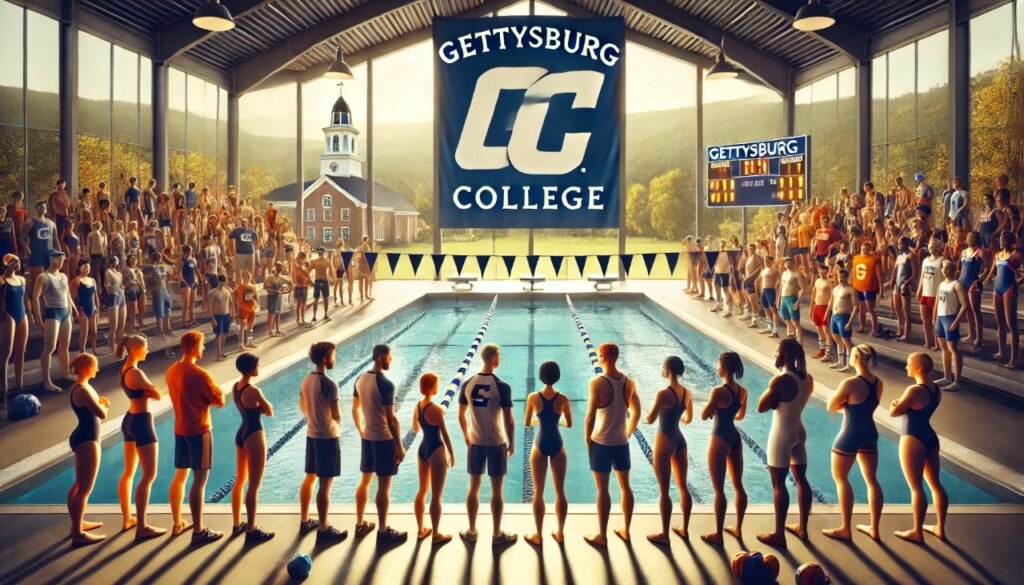Gettysburg College Swim Team Student Leaves Amid Controversy

Gettysburg College Swim Team Student
Sports teams often symbolize unity and camaraderie, but recent events involving the Gettysburg College swim team student reveal how a single incident can challenge these values. A student-athlete is no longer enrolled at Gettysburg College after allegations of a racial slur being etched onto a teammate’s chest surfaced, according to school officials. This unfortunate event has sparked widespread conversations about racism, accountability, and the role of institutions in fostering inclusion.
What Happened?
The incident, reported during the fall semester, involved a Gettysburg College swim team student accused of carving a racial slur onto a teammate’s chest. While details about how and when the act occurred remain under investigation, the aftermath has deeply affected both the individuals involved and the campus community.
College officials confirmed that the student responsible was removed from the institution. In a statement, they emphasized their commitment to maintaining a safe and inclusive environment. However, the incident has left lingering questions about how racism continues to infiltrate spaces meant for collaboration and teamwork.
The College’s Immediate Response
Gettysburg College acted quickly once the incident was reported. School officials issued a statement condemning the act and expressing support for the victim. The administration conducted a thorough investigation and worked closely with the swim team to address concerns.
Counseling services and support resources were made available to all affected students. In addition, the college held a town hall meeting to provide a platform for the community to voice their concerns and share ideas for improvement.
Impact on the Swim Team
For the swim team, this controversy has been a profound challenge. Team sports rely heavily on trust and mutual respect. An incident like this disrupts the bonds that athletes work hard to build.
Some team members expressed their dismay, calling the act “shocking” and “unacceptable.” Others noted the emotional toll it has taken on the entire team, especially the victim. The coaching staff has emphasized their commitment to fostering an environment that prioritizes respect and integrity moving forward.
Racism in Collegiate Sports
This incident highlights a broader issue: the persistence of racism in college sports. While sports often unite individuals from diverse backgrounds, they are not immune to societal prejudices. Across the country, student-athletes have faced racial discrimination in various forms, from verbal abuse to exclusion.
Racism in sports impacts more than just the individuals involved; it reflects the need for systemic change. Athletic departments and colleges must prioritize education, accountability, and diversity initiatives to ensure that incidents like this are not repeated.
Gettysburg College’s Steps Toward Inclusion
In response to the incident, Gettysburg College has implemented several measures to promote inclusion:
- Mandatory Training: All athletes and coaches must attend diversity and inclusion workshops.
- Policy Revisions: The athletic department is reviewing its code of conduct to include stricter anti-discrimination policies.
- Ongoing Conversations: Campus leaders are encouraging dialogue about race, identity, and community values.
These efforts aim to create a culture where all students feel valued and respected.
Community Reactions
The campus community has been vocal in its response. Many students and faculty members have expressed their disappointment but also see this as an opportunity for growth.
Student organizations, such as the Black Student Union, have organized events to raise awareness about racism. Faculty members have integrated discussions on inclusion into their curriculum, ensuring that these conversations extend beyond the immediate aftermath.
Alumni have also weighed in, with some urging the college to take even stronger action. Others have expressed hope that this incident will lead to lasting positive change.
Challenges of Addressing Racism
Tackling racism is not a simple task. It requires both individual and institutional effort. For Gettysburg College, this means balancing accountability with education.
Some challenges include:
- Resistance to Change: Not all students and staff may fully support new policies.
- Emotional Impact: Incidents like this leave lasting scars on those directly affected.
- Ensuring Effectiveness: It can be difficult to measure the success of anti-racism initiatives.
Despite these obstacles, Gettysburg College’s response demonstrates a willingness to confront these challenges head-on.
Lessons Learned
The events involving the Gettysburg College swim team student offer valuable lessons for other institutions:
- Swift Action is Crucial: Addressing incidents immediately sends a clear message about the institution’s values.
- Transparency Matters: Open communication builds trust and fosters community involvement.
- Education is Key: Prevention requires continuous learning and awareness.
By applying these principles, colleges can create environments where every student feels safe and respected.
The Importance of Accountability
Accountability plays a central role in addressing racism. In this case, the college’s decision to remove the student responsible underscores the importance of consequences. However, accountability should also extend to creating systems that prevent such incidents in the first place.
Institutions must hold themselves to high standards, regularly assessing and improving their policies. This ensures that accountability is not just reactive but proactive.
Looking Ahead
The incident has cast a spotlight on the need for ongoing vigilance against racism. For the Gettysburg College swim team and the broader campus, this is a moment of reckoning but also an opportunity for transformation.
Students, staff, and alumni are working together to ensure that the lessons learned lead to tangible change. While the road ahead may be challenging, the college community remains committed to fostering a culture of inclusion and respect.
FAQs
What happened with the Gettysburg College swim team student?
A student was removed from Gettysburg College after allegedly carving a racial slur onto a teammate’s chest, sparking widespread concern.
How did Gettysburg College respond?
The college condemned the act, launched an investigation, and implemented support services and inclusion initiatives to address the incident.
What steps are being taken to prevent future incidents?
Mandatory diversity training, policy revisions, and ongoing community dialogues are among the measures being implemented.
What has been the impact on the swim team?
The incident has disrupted team trust and morale, prompting the coaching staff to emphasize respect and integrity moving forward.
Why is accountability important in cases like this?
Accountability ensures that harmful actions have consequences while encouraging institutions to create systems that prevent similar incidents.
What lessons can other colleges learn from this?
Swift action, transparency, and a focus on education are key to addressing racism and fostering inclusion in collegiate environments.






